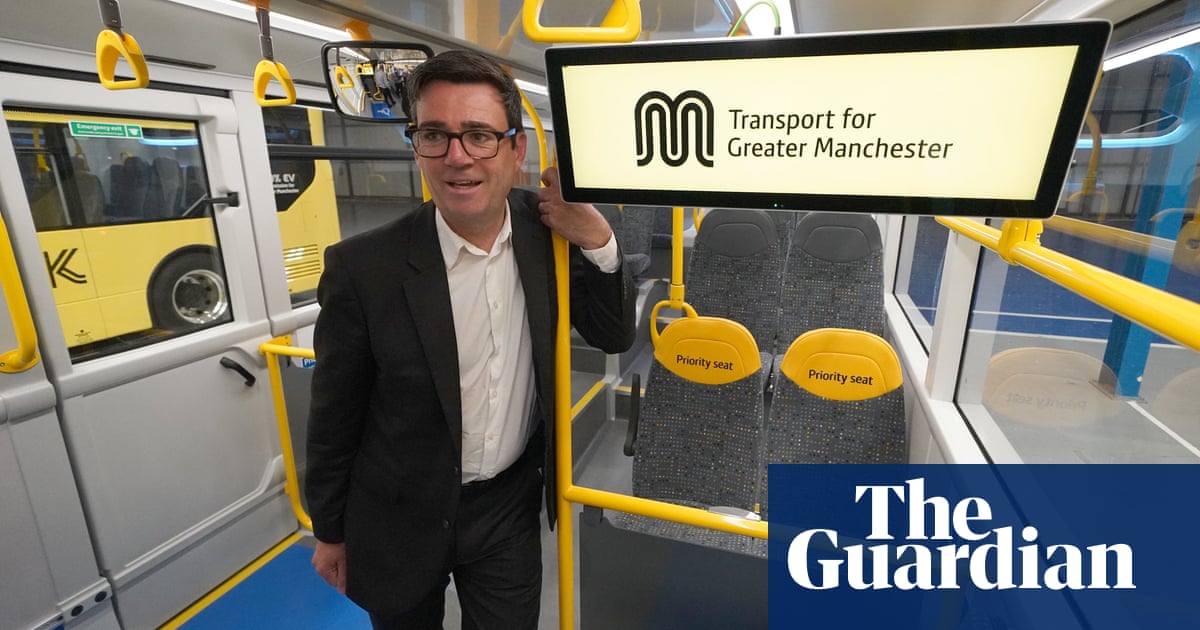
Andy Burnham has pleaded with residents of Greater Manchester not to chuck its latest fleet of hire bikes into the canal when the region’s £17m rental scheme opens this month.
Burnham, the mayor of Greater Manchester and a recent convert to cycling, admitted he was nervous about the launch of the Bee Bikes after their predecessors ended up swimming with the fishes.
“I would just say to people: these are your bikes, we own them. So, please look after them,” he said. “Damaging your own stuff doesn’t make sense.” He insisted he would rather they didn’t call them “Burnham Bikes” but stick to their Sunday name, inspired by Manchester’s civic symbol, the worker bee.
In 2017 Manchester was the first UK city to test dockless bike hire when the Chinese firm Mobike pedalled into town.
Within a year Mobike gave up, after hundreds of bikes each month ended up at the bottom of the Manchester Ship Canal and various other waterways. Others were strung up lampposts, abandoned in the Arndale shopping centre, locked in secure car parks and hidden in sheds. A startling number had their locks hacked off – and with them, their inbuilt GPS trackers.
Bee Bikes are owned by Greater Manchester but will be operated for the first five years by Beryl, a private company which runs schemes in the West Midlands, Bournemouth, the Isle of Wight and beyond. They are part of Burnham’s aim to build the UK’s first carbon-neutral transport city region network by 2031, consisting of bikes, buses and trams.
By summer 2022, 1,500 yellow bikes, including 300 electric models, will be available to the public in parts of Manchester, Salford and Trafford. If successful, the fleet will be expanded to cover the whole of Greater Manchester, with more electric bikes in the hilliest suburbs, according to Chris Boardman, the Olympic champion turned Greater Manchester travel commissioner.
He admitted being apprehensive in the run-up to the 18 November launch. “Vandalism is something that you don’t have control over,” he said. But he stressed that Greater Manchester police (GMP) had been involved in planning the scheme, whereas Mobikes were just “dumped on the street” with minimal notice.
As well as being too easy to pinch, Mobikes were also uncomfortable, having only one gear and apparently being designed for tiny people. “I’m only 5ft 8 and I still couldn’t get the saddle to go high enough,” said Boardman.
The Bee Bikes have three gears and the saddle can be adjusted to suit riders between 4ft 11in and 6ft 5in (149cm to 195cm). It costs 50p to unlock a pedal bike and 5p a minute of cycling, or £1 to unlock an e-bike and 10p a minute to ride.
Cycle hire stations will typically be between 300 metres and 500 metres apart, ensuring that up to 198,000 residents are never more than a five-minute walk from a bicycle.
The bikes should be parked in branded docks, otherwise riders receive fines of £5 or £10 depending on how far away they abandon theirs. Unlike London’s Santander scheme, the dock does not lock the bike in place, but encourages sensible parking.
If the dock is full, users can still leave their bike locked to itself nearby and not get penalised. “It means you never need miss your train because there are no spaces at the station,” said Boardman.
A team of 17 Beryl staff will be whizzing around the city redistributing and fixing bikes all day and night, he added.
Phil Ellis, the chief executive of Beryl, insisted he had no hesitation to pitch for the contract. “It might have seemed that Manchester is the wild west, but it wasn’t really. Vandalism was not a unique problem to the city. It happens everywhere. We were thrilled to be selected to run the scheme,” he said.
Ultimately, the success of the Bee Bikes will not be simply down to how many remain roadworthy, but whether Mancunians like to ride them. A lot of that comes down to safety, said Graeme Sherriff, a researcher in healthy active cities at the University of Salford.
“The cycling environment generally is also a challenge. It has to be cycleable if you have a bike hire scheme,” he said. “Currently, Greater Manchester isn’t very cycle-friendly, but it is getting better.”
Boardman is trying to build 1,800 miles of safe walking and cycling routes as part of the Bee Network, but so far only a fraction of the network is complete after wranglings with Greater Manchester’s 10 councils.
Cycle hire failures …
Edinburgh’s Just Eat cycle hire scheme lasted three years before its operator, Serco, threw in the towel in September, saying it would not extend the contract amid higher-than-expected costs for vandalism. In 2020 about one in four of the scheme’s 550 bikes had to be repaired every week.
The CEO of Mobike admitted in a company blog that more than 200,000 of its bicycles were lost to theft or vandalism in 2019. It now no longer operates outside China.
Ofo, another Chinese firm, gave up on the UK in 2019 after ill-fated schemes in London, Norwich, Sheffield and Oxford.
… and successes
Santander Bikes, aka Boris Bikes, are the grandparents of the bike hire world, having been launched in 2010 by the then mayor of London. Londoners now have access to more than 750 docking stations and more than 14,000 bikes.
This year Leicester launched what the council said would be the UK’s biggest docked electric bike-sharing scheme. Santander Cycles Leicester will eventually make 500 electric bikes available to hire from 50 locations.
Next Bikes, which operates Glasgow’s Ovo bike sharing programme, expanded its scheme before Cop26 came to the city.












